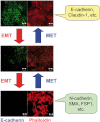Transforming growth factor-beta signaling in epithelial-mesenchymal transition and progression of cancer
- PMID: 19838011
- PMCID: PMC3621568
- DOI: 10.2183/pjab.85.314
Transforming growth factor-beta signaling in epithelial-mesenchymal transition and progression of cancer
Abstract
Transforming growth factor-beta (TGF-beta) is a multifunctional cytokine that induces growth arrest, tissue fibrosis, and epithelial-mesenchymal transition (EMT) through activation of Smad and non-Smad signaling pathways. EMT is the differentiation switch by which polarized epithelial cells differentiate into contractile and motile mesenchymal cells. Cell motility and invasive capacity are activated upon EMT. Multiple transcription factors, including deltaEF1/ZEB1, SIP1/ZEB2, and Snail/SNAI1, are induced by TGF-beta-Smad signaling and play critical roles in TGF-beta-induced EMT. In addition, both non-Smad signaling activated by TGF-beta and cross-talk with other signaling pathways play important roles in induction of EMT. Of these, Ras signaling synergizes with TGF-beta-Smad signaling, and plays an important role in the induction of EMT. TGF-beta inhibitors prevent invasion and metastasis of advanced cancer through multiple mechanisms, including inhibition of EMT. The discovery of molecules that inhibit TGF-beta-induced EMT but not TGF-beta-induced growth arrest may be an ideal strategy for treatment of invasion and metastasis of cancer.
Figures




References
-
- Schilling, S.H., Hjelmeland, A.B., Rich, J.N. and Wang, X.F. (2008) TGF-β: A multipotential cytokine. InThe TGF-β Family (eds. Derynck, R. and Miyazono, K.). Cold Spring Harbor Laboratory Press, New York, pp. 45–78
Publication types
MeSH terms
Substances
LinkOut - more resources
Full Text Sources
Other Literature Sources
Research Materials

